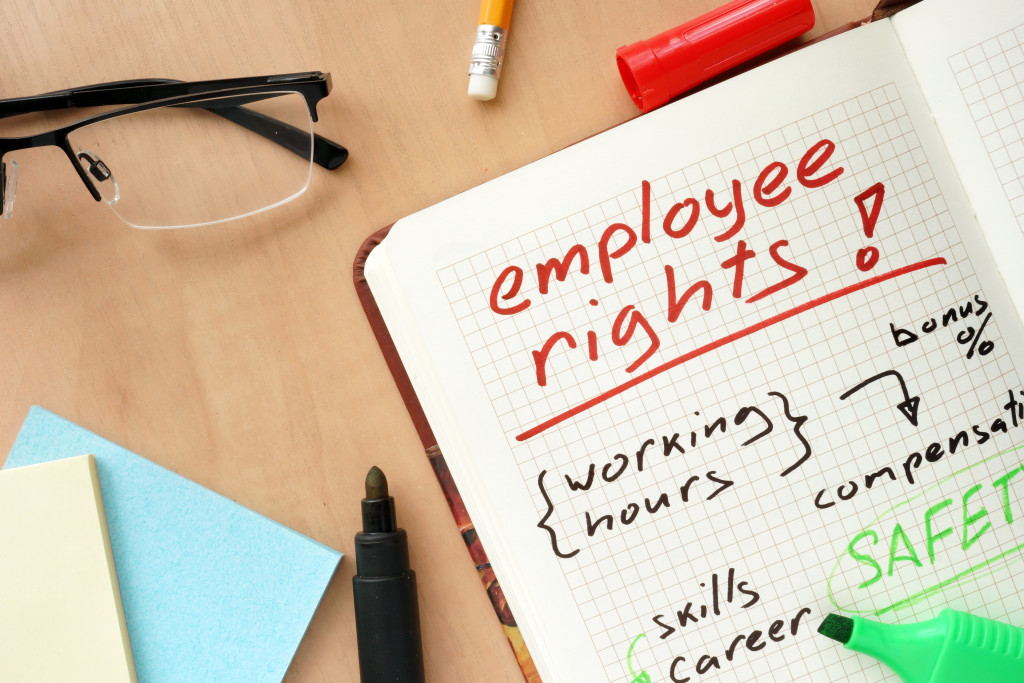- A safe and healthy workplace can be ensured by reporting to supervisors or HR departments.
- Discrimination in the workplace is illegal, and documented evidence should be kept if needed for legal action.
- Minimum wage and overtime must be paid fairly, while family and medical leave policies must be followed.
- Privacy rights must be respected, with appropriate action taken if violated.
As an employee, you have certain rights that are protected by law. These rights ensure that you are treated fairly and ethically in the workplace. It’s essential to be aware of your rights as an employee so that you can stand up for yourself if necessary. This guide will discuss the employee rights that you should know about.
1. The Right to a Safe and Healthy Workplace
Your employer must ensure that you have a safe and wholesome work environment. This means they must minimize the risk of injury or illness. If you believe your workplace is unsafe or unhealthy, report it to your supervisor or HR department. If they fail to address the issue, you may need to contact an injury lawyer for assistance.
A reliable lawyer can help you understand your legal options if you’ve been injured. An injury lawyer can advise you on whether you’re eligible for workers’ compensation or if you have grounds for a personal injury lawsuit. They can also help you negotiate with your employer or insurance company to ensure you receive fair compensation for your injuries.
2. The Right to a Non-Discriminatory Workplace

Discrimination in the workplace is illegal. This means you cannot be mistreated based on race, gender, age, religion, or other protected characteristics. If you believe you have been discriminated against, you should report it to your supervisor or HR department. If they fail to address the issue, you may need to contact an employment discrimination lawyer for assistance.
Here are tips for dealing with discrimination in the workplace:
Document Your Claims
If you believe that you are a victim of discrimination, it is essential to document your claims as quickly and thoroughly as possible. Keep copies of any correspondence with your employer related to the issue. Additionally, take detailed notes when discussing the situation with supervisors or HR representatives. This information may prove invaluable should you need to pursue legal action later on.
Know Your Rights
It’s essential to understand your rights as an employee before approaching a potential discriminatory situation in the workplace. Ensure you are familiar with federal and state laws about employment discrimination, and contact an employment attorney if necessary for clarification or advice about what steps to take next.
Be Proactive
If you believe that an employer has violated your rights, don’t wait to take action. Contact the HR department or a supervisor immediately and explain the situation. If it is not resolved internally, consider seeking legal help.
Get Professional Help
An experienced employment discrimination lawyer can help you understand your legal rights and give you advice on how to move forward with potential legal action. They can also represent you in court and negotiate a settlement on your behalf if necessary. Consider speaking to an attorney before filing any paperwork or taking other steps toward resolving the issue.
3. The Right to Fair Pay

You have the right to be paid fairly for your work. This means that your employer must pay you at least the minimum wage and overtime if you work more than 40 hours per week. If you believe you’re not being paid fairly, you should bring it up with your supervisor or HR department. If they fail to address the issue, you may need to contact a wage and hour lawyer for assistance.
A wage-and-hour lawyer can help you understand your legal rights if you’re not paid fairly. They can advise you on whether you’re eligible for back pay or damages and help you negotiate with your employer to ensure you receive fair compensation.
4. The Right to Family and Medical Leave
You have the right to take time off from work to care for yourself or a family member who is seriously ill. This is known as family and medical leave. Your employer is legally required to provide you with up to 12 weeks of unpaid leave per year for these purposes. If you believe your employer denies you this right, you should contact a family and medical leave lawyer for assistance.
A family and medical leave lawyer can help you understand your legal rights if you’re denied family and medical leave. They can advise you on whether you have grounds for a lawsuit and can help you navigate the legal process. They can also help you negotiate with your employer to ensure you receive the leave you’re entitled to.
5. The Right to Privacy
You have the right to privacy in the workplace. Your employer cannot monitor your communications or activities without your consent. If you believe your employer violates your privacy rights, report it to your supervisor or HR department. You may need to contact an employment lawyer if they fail to address the issue.
An employment lawyer can help you understand your legal rights if your privacy rights are violated. They can advise you on whether you have grounds for a lawsuit and can help you navigate the legal process. They can also help you negotiate with your employer to respect your privacy rights.
Closing Thoughts
As an employee, you must be aware of your rights and stand up for them if necessary. Your employer has a legal obligation to provide you with a safe and healthy workplace, to treat you fairly, to pay you fairly, to provide you with family and medical leave, and to respect your privacy. If you believe that your rights are being violated, you should take action to protect yourself.





